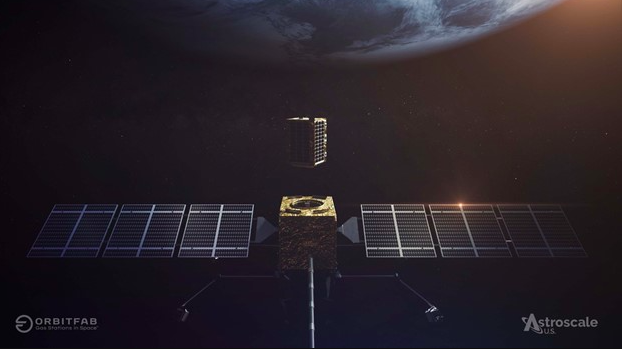
ORLANDO — The National Space Council is expected to soon release a plan parsing out regulatory authorities for non-traditional space activities among federal agencies — such as on-orbit servicing, a capability that the Pentagon is hoping commercial industry can bring to the Space Force’s table — according to a senior Commerce Department official.
“They’re pretty close to wrapping it up,” Richard DalBello, head of the Office of Space Commerce, said on Wednesday. However, he wouldn’t be drawn on what that agreement might entail or on a more precise date for any announcement.
The ongoing White House-level review of what is often called “mission authorization and supervision” responsibilities has not been simple, according to several government officials involved, with the key agencies with current legal say over space regulations jockeying for a piece of the regulatory pie. In particular, these sources say, there is an ongoing spat between the Transportation and Commerce Departments over licensing authority for space operations that could be considered as “transportation” — such as delivering cargo with rockets — with the discord stalemating the interagency discussions for a number of weeks.
DoT oversees the Federal Aviation Administration (FAA) that regulates launch and landing of spacecraft with an eye towards the safety of people on the ground, as well as for aircraft. Commerce oversees the National Oceanic and Atmospheric Administration (NOAA) that licenses commercial remote sensing firms.
While the Obama administration had been eyeing FAA as the regulator of “novel” space activities, the Trump administration’s 2018 Space Policy Directive-3 essentially laid the groundwork to establish Commerce as a one-stop-shop for most, if not all, non-traditional space operations. However, internal bureaucratic wrangling at NOAA, and a skeptical Congress, blocked any real progress toward that goal.
Noting that he was deliberately being a bit “provocative,” the former associate administrator of FAA’s Office of Commercial Transportation George Nield told the Space Force-sponsored Space Mobility Conference here on Tuesday that all things considered, perhaps the time has come to think about space travel in the same terms as long-haul trucking, rail transport or air travel.
“I think, given the level of activity we’re seeing — innovation, all the new ways of doing business that are being considered — it may be that we are now at the point where we should seriously consider recognizing commercial spaceflight as an independent mode of transportation at the Department of Transportation,” he said.
“You could pretty easily do that by taking the Office of Commercial Space Transportation from the FAA, and just returning it to DoT, which is where it was established back in 1984 by President [Ronald] Reagan. And that that would give it an opportunity to be at the table to maybe have some streamlined interaction with industry, and strengthen the partnerships that we already have with NASA, the FAA, Commerce, the State Department, all the other organizations that are stakeholders in this endeavor,” Nield added.
Meanwhile, innovative commercial firms already are pressing ahead with plans to undertake a number of missions that fall in-between the agency cracks. These include on-orbit refueling and repair, removing dangerous space junk from orbits where satellites live, in-space manufacturing, mining the Moon and asteroids, and even commercial space stations with human crews.
The Defense Department is interested in a number of these new types of missions, such as point-to-point delivery of goods (and maybe even troops) through space, which the Air Force Research Laboratory and US Transportation Command are exploring under the Rocket Cargo project. Further, Space Command is particularly keen on on-orbit refueling that could provide “mobility” in space and allow Space Force satellites to maneuver rapidly and more often to better keep tabs on potential on-orbit threats, hide from adversary spacecraft, avoid counterspace weapons, and even hunt down and disable enemy satellites and spacecraft.
The National Space Council, led by Vice President Kamala Harris, has held a series of what it called “listening sessions” to understand what commercial space companies would like to see regarding the future regulatory environment — views that, as one would expect, vary among companies that have different business models and priorities.
“It’s definitely an issue that we’re taking seriously and we continue to progress along with as well,” Chirag Parikh, the council’s executive secretary, said in a Feb. 9 speech to the 25th Annual FAA Conference on Space Transportation.
The listening sessions had made clear a number of things about industry concerns, he added.
“One is the need for this type of framework environment, for clear, flexible, predictable rules and a regulatory environment needed to ensure that the US commercial space sector continues to lead the way. Secondly, the need for defined roles and responsibilities, opposed to what some people have called the ‘nebulousness of authorization’ for some of these types of missions,” Parikh said.
He added that “just as the climate crisis is causing us to think about the sustainability of Earth and our population,” there is a growing recognition among space companies that the “sustainability of our outer space environment” needs to be considered as more actors undertake more diverse types of on-orbit activities.
In the end, though, whatever the administration might propose, Congress is going to want the last word. While sources say there has been some internal Biden administration consideration of using an executive order to shake things out — based on the president’s unilateral authority to enforce the requirements of the 1967 Outer Space Treaty for national governments to exercise supervision of their commercial space actors — it is Congress’s job to provide the statutory authority for the remits of the various federal agencies. Thus, as DalBello noted, there is an ongoing “dialogue” between the administration and Congress.
However, lawmakers too are divided on how best to proceed and what agencies should be given what new authorities. In general, Republicans have been putting a priority on economically bolstering US space companies, and for the most part have an allergy to the word “regulations.” Democrats, on the other hand, have been a bit more concerned about issues of safety and the need to establish a governance framework that can stave off harm to the space environment.
That said, unlike many other areas of policy, there is a lot of bipartisanship within Congress on commercial space issues, and by and large lawmakers are keen on supporting the commercial space industry’s growth and global market position. With that in mind, the Biden administration has embraced of the catch-phrase made popular during the Trump administration of a “light touch” approach to new space regulations.
“A phrase you hear often is ‘light touch, light touch regulation’ — so, trying to understand what is necessary to ensure safety or ensure international obligations, or what is the minimum necessary,” DalBello summed up. “We are mindful of that.”

